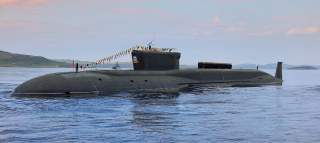America and Britain Are Preparing to Refight the Battle of the Atlantic (But Against Russia)
The Second Fleet is Back--and ready to take on the Russian Navy.
If a Nazi U-boat captain were to magically surface in the Atlantic, he might think it was 1943. Or, a Soviet sub skipper might think it was 1983.
America and Britain are reviving their North Atlantic defenses—but this time against Russian instead of Nazi or Soviet submarines.
Last month, the U.S. Navy formally reactivated the 2nd Fleet, established soon after World War II to defend the Atlantic against the Soviet threat. It blockaded Cuba in 1962 and secured the vital shipping lanes between the United States and Western Europe, until deactivated in 2011 in light of the Cold War's end.
But now the 2nd Fleet is back, with control over ships and aircraft stretching from the U.S. East Coast to Russia’s northern European waters.
Meanwhile, Britain just announced that it had established a new Joint Area of Operations for the North Atlantic. “It will mean the region becomes a priority for the UK government allowing Royal Navy ships and RAF aircraft to be deployed to the region much more regularly,” Admiral Philip Jones, head of the Royal Navy, told Britain’s Skye News.
Jones didn’t shy from naming Russia as the threat. “It is an intensifying resurgence of capability and scale that we didn’t necessarily see coming maybe ten years ago,” he said. “We have had to respond to that—it is also very modern, it is very capable. The signature of their vessels, their deployability, their capability is very impressive. They’ve clearly been investing in the research and development to be able to do this.”
Adm. John Richardson, U.S. Chief of Naval Operations, said last month that Russian submarines were operating in the North Atlantic at a level not seen since the Cold War. Russian surface warships sailed through the English Channel earlier this year: a hundred years ago, London might have treated this as act of war.
Indeed, while technology has changed over the last century, the essence of the North Atlantic strategic situation has not. In World War I, the challenge was keeping the Kaiser’s primitive U-boats from severing the shipping lanes that kept Britain from starving and allowed U.S. troop convoys to reach Europe. The same applied to more deadly Nazi U-boats, as well as battleship raiders like the Bismarck, in World War II. In both cases, Britain came perilously close to starvation and losing the war.
During the Cold War, the threat was Soviet subs sinking convoys of U.S. reinforcements desperately needed to bolster the outnumbered NATO troops against a Soviet blitzkrieg. To some extent, this would be still be true if NATO and Russia came to blows (much smaller blows than the Cold War) over a Russian invasion of the Baltic States.
Recommended: What Will the Sixth-Generation Jet Fighter Look Like?
Recommended: Imagine a U.S. Air Force That Never Built the B-52 Bomber
Recommended: Russia's Next Big Military Sale - To Mexico?
Recommended: Would China Really Invade Taiwan?
One modern twist is that Russia’s targets wouldn’t just be merchant ships, but also communication links. America and Britain fear that Russian ships will attempt to sever the undersea cables through which much the West’s telecommunications flows.
“We are aware Russians have the capability to detect and work on those cables and of course they are doing this in very difficult environmental conditions, at very great depth,” said Admiral Jones.
“The very fact they are going to where we know the cables are and using vessels that are coming away from the mother ship in order to get close to the cables is a sign that they are at the very least surveying them and potentially looking to do operations more than that. Therefore we have to be able to counter that.”
Of course, merely standing up administrative commands doesn't change much. The question is, what additional resources will be allocated to secure the North Atlantic? That's a very difficult issue for Britain, which is short of sub-hunting destroyers even as it struggles to pay for big-ticket ships like aircraft carriers. At the same time, the United States must prepare for an Atlantic conflict while simultaneously girding for a massive confrontation with China in the Pacific.
Michael Peck is a contributing writer for the National Interest. He can be found on Twitter and Facebook.


